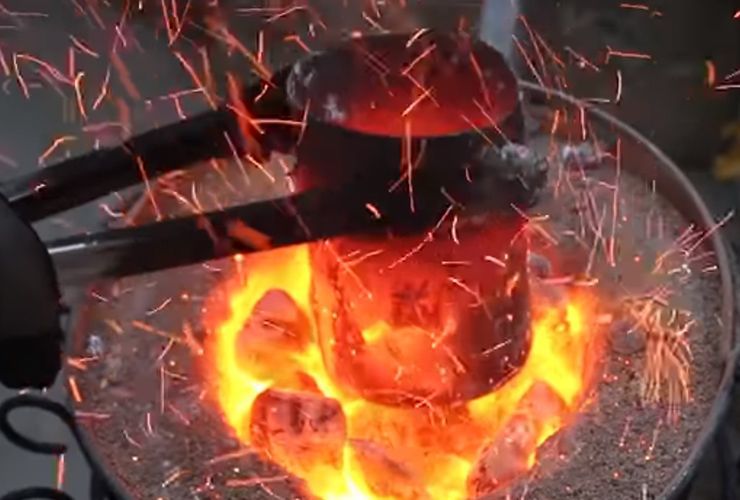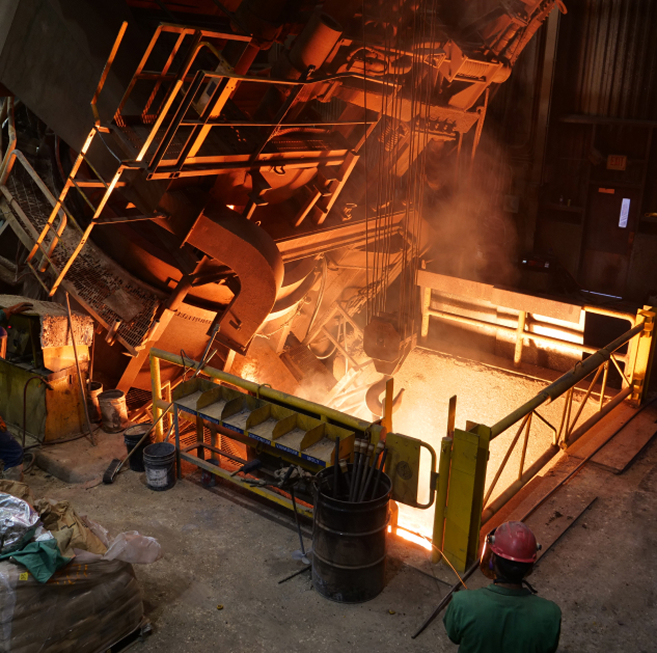A In-Depth Guide to Metal Casting Methods and Their Contemporary Roles
Wiki Article
A Comprehensive Guide to Metal Casting: Benefits and Solutions Supplied by Foundries
Metal casting is a crucial procedure in numerous sectors, using many advantages through the services of factories. These facilities transform molten metal right into accurate and sturdy components, satisfying certain client needs. By using sophisticated modern technologies, shops ensure quality and effectiveness in manufacturing. However, the details of metal casting and the varied strategies entailed elevate crucial questions concerning its role in modern-day production. What technologies lie ahead in this important area?Understanding the Metal Casting Process
The metal casting process is an essential strategy made use of in making to produce complex forms and parts. This approach includes putting molten metal into a mold and mildew created to form the wanted things. The process starts with pattern creation, which works as a template for the mold and mildew. Metal Casting. Different materials, such as sand, metal, or ceramic, are used for mold-making, relying on the specific demands of the casting
When the mold is ready, molten metal is put into it and enabled to cool down and strengthen. After solidification, the mold and mildew is removed, disclosing the actors part. Various strategies, consisting of sand casting, financial investment casting, and die casting, are used, each suited to various applications and products. Quality control actions, such as inspections and testing, are necessary to assure the final product satisfies specs. On the whole, the metal casting process plays a crucial role in producing components for sectors ranging from auto to aerospace.
Key Perks of Metal Casting
Metal casting uses considerable advantages that make it a recommended production technique in different markets. Its design flexibility and precision enable complex forms, while affordable automation boosts effectiveness. Additionally, the adaptability and strength of materials made use of in casting add to the durability of the final products.Style Flexibility and Accuracy
Launching impressive style versatility and accuracy, metal casting permits engineers and designers to create detailed shapes and attributes that would certainly be impossible or tough to achieve with various other making techniques. This capability allows the production of intricate geometries, internal structures, and great details that enhance product performance and visual appeals. In addition, numerous casting strategies, such as sand casting, financial investment casting, and die casting, give additional choices for customization, accommodating diverse material residential properties and job requirements. The versatility of mold and mildews allows adjustments throughout the style stage, improving the change from principle to end product. Eventually, metal casting sticks out for its capacity to deliver high-precision elements, making it a vital process in markets varying from automotive to aerospace and past.Affordable Automation
Cost-efficient automation stands as one of the key advantages of metal casting, making it possible for suppliers to produce huge amounts of parts at a lower cost each. This effectiveness arises from the capability to develop detailed mold and mildews that can be reused several times, considerably minimizing setup and functional costs. In addition, metal casting procedures, such as sand casting and pass away casting, enable for high throughput, making it viable to meet the demands of massive manufacturing runs. The decreased material waste and energy intake even more enhance cost financial savings, making metal casting an attractive choice for industries needing mass components. In general, the affordable nature of metal casting positions it as a preferred method for makers intending for financial effectiveness in their production procedures.Product Adaptability and Stamina
One of the standout attributes of metal casting is its remarkable material versatility, which permits using a variety of steels and alloys. This versatility allows manufacturers to pick products that best fit their certain applications, from aluminum and bronze to iron and steel. Each metal uses distinct buildings, including differing degrees of strength, corrosion resistance, and thermal conductivity. Metal casting can produce parts that fulfill strict performance requirements throughout diverse markets, such as automotive, aerospace, and building and construction. Furthermore, the toughness of actors steels can be enhanced with numerous treatment procedures, making sure durability and longevity. Metal Foundry. In general, the combination of material versatility and fundamental strength makes metal casting a favored choice for producing top quality partsKinds Of Metal Casting Strategies
Metal casting includes a range of techniques that deal with different production demands and product properties. Common approaches consist of sand casting, which uses a sand mold and mildew for complicated shapes, and financial investment casting, understood for its precision and surface finish. Die casting is one more method that employs high-pressure shot of molten metal right into mold and mildews, perfect for mass production of tiny components.Covering molding supplies a faster alternate, using a resin-coated sand to develop thin-walled molds, while shed foam casting allows for intricate styles without the demand for a core.
Furthermore, continuous casting is utilized for creating lengthy areas of metal, such as bars or sheets, by strengthening molten metal in a continual procedure. Each strategy presents special benefits and is picked based on elements like the called for information, production volume, and product kind, guaranteeing exceptional results in metal manufacture across numerous sectors.
The Function of Foundries in Metal Casting
Shops play a pivotal role in the metal casting process, serving as the centers where molten metal is changed right into finished products. These specialized facilities are equipped with the essential tools and innovations to deal with various steels, ensuring top quality results. Foundries are in charge of numerous crucial features, consisting of thawing the metal, putting it into mold and mildews, and allowing it to solidify.Furthermore, they preserve strict safety and security and environmental standards to secure employees and reduce ecological influence. Experienced professionals and engineers collaborate to optimize casting processes, enhancing effectiveness and reducing waste. Foundries additionally engage in high quality control measures, making sure that the final products satisfy certain tolerances and specifications. This quality control is essential for sectors that rely upon accurate components, such as automobile and aerospace. As an outcome, shops contribute significantly to the overall production landscape, making it possible for development and growth throughout numerous industries.
Customized Metal Casting Services
Custom metal casting services provide customized style remedies that satisfy particular customer requirements. These services additionally provide material selection competence, making certain the ideal metal is picked for the wanted application. Such adaptability and expertise boost the overall high quality and efficiency of the final product.
Customized Design Solutions
Customized layout services in metal casting supply makers with the versatility to develop components that satisfy details efficiency and aesthetic demands. Shops use personalized solutions that useful content permit clients to define dimensions, forms, and surface area finishes to achieve preferred results. This customization process usually consists of partnership between engineers and developers, making sure that the last items align with functional requirements and industry standards. Advanced modern technologies, such as computer-aided layout (CAD) and simulation software program, enable accurate modeling and screening of elements before production, minimizing errors and boosting efficiency. By leveraging tailored design options, companies can maximize performance while reducing waste and expenses, ultimately bring about an extra competitive side in the market. This adaptability is crucial for markets needing distinct applications and requirements.Material Selection Know-how
When selecting materials for metal casting, experience plays a crucial duty in making sure that the best option lines up with both performance demands and cost-effectiveness. Foundries use knowledgeable professionals who recognize the buildings of various steels and alloys, allowing them to suggest suitable products for details applications. Variables such as stamina, deterioration resistance, and thermal conductivity are very carefully considered to meet the client's demands. In addition, sector patterns and improvements in material scientific research inform these choices, making it possible for factories to stay affordable. By leveraging their expertise, foundries can assist clients in guiding through complex material options, inevitably leading to boosted item quality and decreased production expenses. This customized knowledge is important for accomplishing effective end results in custom-made metal casting services.Quality Control in Metal Casting
Quality assurance in metal casting is important to ensure that the last products satisfy the required specs and performance criteria. Foundries use a range of strategies and techniques to ensure the finest of cast parts. This process begins with strict product inspections, confirming that resources abide by sector criteria. Throughout the casting procedure, real-time monitoring and testing are conducted to examine parameters such as temperature level, mold and mildew honesty, and dimensional accuracy.
Applications of Metal Castings Throughout Industries
Metal spreadings play a crucial role in various industries, working as the foundation for many applications. In the vehicle market, cast elements such as engine blocks and transmission real estates are required for lorry performance and reliability. The aerospace industry relies upon precision castings for vital components that guarantee security and effectiveness in flight. Furthermore, the building market uses metal castings for components, fittings, and architectural components, boosting the durability of buildings and infrastructure.Additionally, the power market advantages from spreadings utilized in turbine blades and various other tools essential for power generation - Aluminum Casting. The clinical field likewise makes use of metal castings in tools and devices, showing the adaptability of this production process. In general, metal spreadings are important to the performance and improvement of diverse markets, showcasing their significance in modern-day technology and infrastructure growth
dig this
Often Asked Questions
What Materials Are Commonly Made Use Of in Metal Casting?
Usual materials made use of in metal casting consist of aluminum, iron, brass, bronze, and steel. Each material supplies distinct homes suitable for various applications, allowing manufacturers to choose the most effective alternative based on weight, strength, and deterioration resistance.How much time Does the Metal Casting Process Typically Take?
The metal casting procedure typically takes numerous hours to a few days, depending on factors such as the complexity of the design, sort of metal utilized, and the specific casting approach employed by the foundry.
What Is the Ecological Impact of Metal Casting?
The ecological effect of metal casting includes power usage, exhausts, and waste generation. Foundries frequently carry out actions to alleviate these results, such as reusing materials and utilizing cleaner modern technologies to decrease their ecological footprint.Can Metal Casting Be Done for Small-Scale Projects?
Metal casting can without a doubt be done for small-scale projects. Different factories provide to such demands, offering tailored solutions that suit limited manufacturing runs while keeping top quality and precision in the final products.What Are the Safety And Security Measures in Metal Casting Foundries?
In metal casting shops, precaution include individual safety tools, proper ventilation, training on equipment usage, emergency situation treatments, normal maintenance checks, and adherence to sector safety requirements he said to reduce threats connected with liquified metal and harmful products.Additionally, metal casting processes, such as sand casting and pass away casting, enable for high throughput, making it feasible to fulfill the demands of massive manufacturing runs. One of the standout characteristics of metal casting is its impressive material adaptability, which enables for the use of a large variety of alloys and steels. Additionally, continual casting is made use of for creating long areas of metal, such as sheets or bars, by strengthening liquified metal in a continual procedure. Factories play a pivotal function in the metal casting process, offering as the centers where liquified metal is transformed into finished items. Typical products used in metal casting include aluminum, iron, steel, bronze, and brass.
Report this wiki page